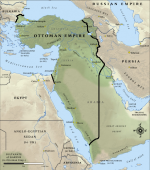Jackson Lennock
Well-known member
Chief of Staff Alekseyev proposed that Russia pressure its Entente allies to accept a separate peace with the Ottomans in an October 1915 letter to Foreign Minister Sergey Sazanov. By 1916 the Ottomans may have accepted. As Russia pushed into Anatolia, the Ottoman public began to get ever more worried. Russia, on the other hand, was mainly concerned with getting the Straits open (solving railway, import-export, and currency crises). But on the other hand, after the Erzurum Offensive (January to February 1916) proved successful and two new battleships entered the Russian fleet, he decided that total defeat of the Ottomans was a preferable route.
Terms likely would have meant [1] Russia keeping some of Ottoman Armenia (including Van), [2] the straights being opened to civilian traffic and closed to the Central Powers, [3] expulsion of German military advisors, and [4] Britain gaining Basra vilayet or (in exchange for abandoning Basra) Southern Palestine. The Ottomans would gain [1] undoing of unfair treaties and [2] waiving of debts.
Terms likely would have meant [1] Russia keeping some of Ottoman Armenia (including Van), [2] the straights being opened to civilian traffic and closed to the Central Powers, [3] expulsion of German military advisors, and [4] Britain gaining Basra vilayet or (in exchange for abandoning Basra) Southern Palestine. The Ottomans would gain [1] undoing of unfair treaties and [2] waiving of debts.


